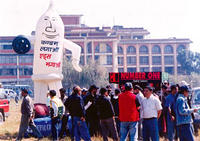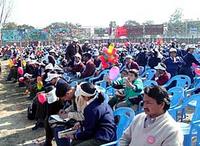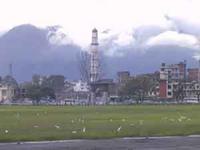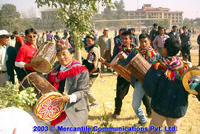(This is a proposed constitution for a proposed new political party for Nepal that is envisioned to operate withing the broad democratic parameters described here:
Proposed Constitution,
Reorganized UN, Methods.)
PreambleThe underlying concept is of a total, transparent democracy.
Article 1: Membership - Any voter in Nepal can become a voting member of the party. Dues are Rs. 5 every four months or Rs. 12 a year if paid at once. A member must also have attended at least one party meeting authorized by the wada chairperson or above every four months. Such meetings must have been announced at least a month in advance, or longer. Such are voting members.
- All such members elect the 5 members of their wada committee. Beyond that it is indirect elections. Any member from the wada may be a contestant. A list is to be prepared of the aspiring contestants in alphabetical order. The top five vote getters get in. There must be at least five contestants. If there are no more slots than contestants, no elections are held.
- One of the five is the wada chair, elected at the same time.
- All members of wada committees and above are known as Active Members of the party. All active members of the party vote to decide on the party's candidate for parliamentary elections.
- There are to be secret ballot elections. Before the ballot is printed, all aspiring names must get together to meet in person for at least one hour to get to know each other and exchange views and attempt a possible consensus list.
- No member may be expelled from the party except through a 60% vote by the committee he or she might be part of. All such decisions may be taken to the Appeals Committee directly above or at the same level - at the district, state, and central levels - by the expelled member for the final, binding decision.
Article 2: Party Structure - There will be a party committee to reflect each level of the state apparatus, 5 for the wada level, 7 for the village level, 9 for the town level, 11 for the city level, 17 for the district level, 21 for the state level, and 31 for the central level.
- If a member of a committee get elected to one at a higher level, that person loses membership of the earlier committee. The vacant seat goes to the next person down the list when elections were held.
- Elections at any one level must be completed nationwide before the one at the next level may be held except when it might not impact that next level elections.
- All wada committee members are voting members and possible contestants of the village/town/city committees. All village/town/city committee members are voting members and possible contestants of the district committees.
- All parliamentary seat candidates in the last held elections in a state are voting members and possible contestants for the state committee.
- All parliamentary seat candidates in the last held elections at the national level are voting members and possible contestants for the central committee.
- The committees expire every four years. It is for the Election Commission to decide precisely when. But the period may not be less than three years.
- Only the party's Election Commission may spend any money on the elections inside the party. Candidates are barred from doing so. The commission will educate all voters on the candidates' bio and political platforms, authored by the candidates themselves, giving roughly equal space to each. The commission may design additional elements to the campaigns.
Article 3: Party President - Elections for the party presidency are to be held by the national Election Commission. Until that happens, the party Election Commission fulfills that role.
- Members of the three state committees, and all popularly elected officials at the state and national levels vote for party president. When there might be an overlap, one person may not be counted as two votes. Only a voter may be a contestant. If there be more than two candidates, a second round of voting should take place between the two finalists. This is also true for distributing party tickets for inter-party elections that invite direct voter participation.
- The election is to be held at the party convention where the candidates offer their visions for the party and the country. More than potential voters may be invited to such a convention.
Article 4: Party Flag And Election Symbol - The flag is to be a sky blue rectangle representing peace, and a golden sun in the middle to represent prosperity.
- The party's election symbol is to be the pole star that symbolizes the party's relentless aspiration to provide the best possible vision for the country's future.
Article 5: Party Candidates For Inter-Party Elections - As to who the party candidate will be is to be decided by the active members at the said level through secret ballot elections held early enough to allow time for the larger election campaigns, unless specifically stated otherwise. A candidate has to be someone in the voting pool, or someone sponsored by at least three members in the voting pool.
Article 6: Election Commission, Appeals Committee - The central committee will elect a 7-member Election Commission from among its members. The commission may use the party structure at all levels to do its work. There must be at least a one degree of vertical separation for a party member to aid an internal party election in a leadership capacity.
- The district, state and central committees are to elect a 3, 5 and 7 member Appeals Committees each.
Article 7: Membership Dues - Membership dues are to be collected by the wada committees and are to be passed on to the village/town/city committees. Each committee keeps one third to the nearest rupee and passes the rest to the committee directly above.
- All book-keeping is to be transparent. Expenses to the last paisa are to be posted online on at least an annual basis.







